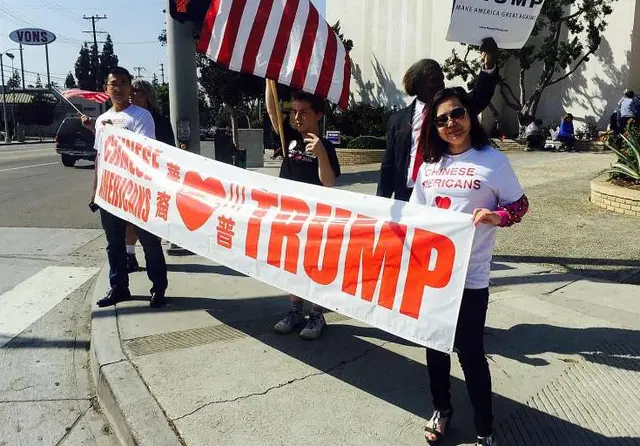At a Donald Trump rally in Anaheim, California, nearly two weeks ago, Ms Zeng Ling shared a stage and shook hands with the presumptive Republican presidential nominee.
The Chinese medicinal physician was at the rally with about 15 other Trump supporters, all wearing T-shirts which read, "Chinese-Americans For Trump".
Ms Zeng, 49, said she joined the group about six months ago, and it organises events using the social media platform WeChat, which is particularly popular in China.
A US citizen for more than 10 years, Ms Zeng said she supports Mr Trump because he is tough on illegal immigrants, will abolish Obamacare and believes he will help improve education in the United States.
"He is correct. We don't want our tax dollars to be spent on all these illegal immigrants," said the San Diego resident, who has already sent in her vote for the California primary today.
"I will never vote for Hillary," she added, referring to Democratic front runner Hillary Clinton. "We can't have four or eight more years of the Democrats."
But Ms Zeng is apparently in the minority.
The most recent Asian voter survey, released by three Asian-American non-profit organisations, shows that 61 per cent of registered Asian- American voters have an unfavourable opinion of Mr Trump and only 19 per cent look upon him favourably.
Candidate preferences aside, the Democrats also have a favourability rating of 64 per cent with Asian- Americans compared with 31 per cent for the Republicans.
And as the Asian-American demographic grows - it is projected that Asians will be the largest immigrant group in the country by 2065 - many argue that this is one community that should no longer be ignored.
Experts say the limited outreach to Asian-Americans thus far is largely down to the exceedingly complex nature of the community as a voting bloc.
There are differences that can be traced to the community's diversity: Vietnamese-Americans - with experience under communist rule - traditionally are ideologically more at home in the Republican Party, just like Korean-Americans who are predominantly Christian and more socially conservative; on the other hand, Indian-Americans, who do not have a Christian tradition, lean Democrat.
The community is difficult to generalise and easy to misunderstand.
This is a group of people who appear to hold many Republican values yet often vote Democrat, are immigrants who never list immigration as a top issue on surveys, and have made the largest shift in presidential voting preferences of any demographic group in the US.
In 1992, just 31 per cent of Asian-Americans voted for Democratic president Bill Clinton. In 2012, the tables completely turned - 73 per cent voted for President Barack Obama.
What accounts for the big shift in voting preferences from Republican to Democrat?
Professor Neil Malhotra from Stanford University, who has conducted numerous studies on Asian-American voting, said that the current support enjoyed by Democrats is more a matter of identity than policy.
"Our research has argued that the main reasons right now that Asians are more likely to be Democratic is that Republicans are viewed as exclusionary, that they exclude people from the social fabric," he said.
But writing them off as purely Democratic voters would also be a mistake, said Dr Karthick Ramakrishnan, a professor of public policy at the University of California, Riverside, and the director of the National Asian American Survey.
For one thing, he noted that about half of Asian-American voters have not registered with either party.
"About a half of them are still making up their minds about political parties and that's because they are the most heavily immigrant population in the electorate," he said. "Most of them did not go to college in the US. They do not know enough about the political system to make a hard impression."
San Francisco native Nolan Chow, 37, who works as an operations manager in a non-profit organisation is one of those who are undecided, saying he has not seen any candidate stand out and may even decide not to vote.
"There are some things I believe in that are Democrat and some things I believe in that are Republican," he told The Straits Times.
The significance of the bloc also lies in its rising numbers. The group represents more than 5 per cent of the vote in seven states - Hawaii, California, Nevada, Washington, New Jersey, New York and Alaska - a large enough number to decide close races.
(THE STRAITS TIMES)
 简体中文
简体中文

